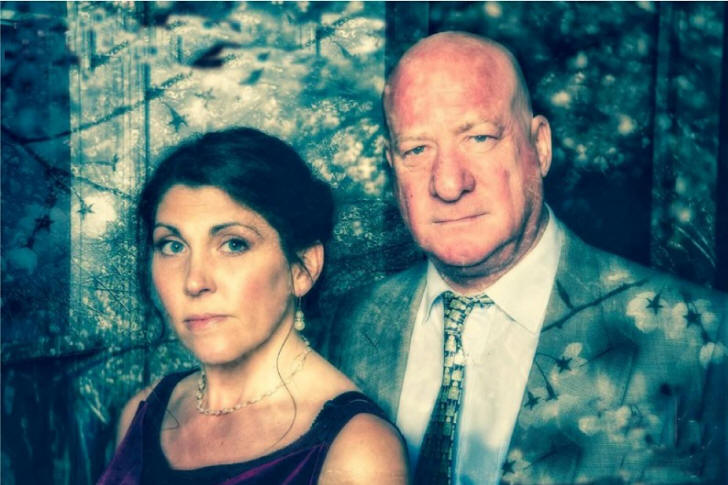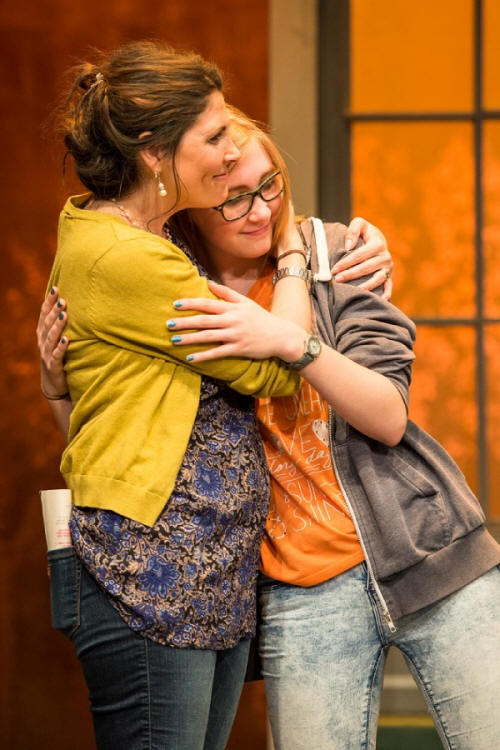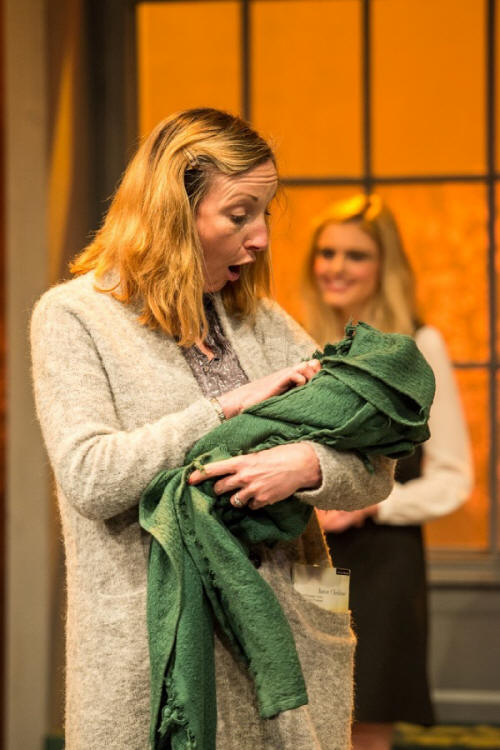
Julie-Anne Randell as Ranevskaya (Lyubov) and
Colin Ritchie as Yermolai Lopakhin (Alexander)
The Cherry Orchard
The Talisman Theatre, Kenilworth
****
It seems to their great credit that the
Midland’s local amateur companies show such courage in programming plays
from the Classical repertoire.
Amid more crowd-pleasing fare, perhaps Ayckbourn
or Godber, Top Girls or Ladies in Lavender, you are just as likely to
encounter Osborne and Wesker, Tennessee Williams, Chekhov, Gogol,
Turgenev, plus Schiller or even the Bard himself:
So credit to the Talisman for offering its take
on Chekhov’s The Cherry Orchard. I recently applauded the
Loft’s Three Sisters. No difficulty in giving this a big thumbs
up, too. Cast from strength, elegantly presented with a sensible modicum
of set/props (John Ellam) -including a pertinent but mostly ignored
rocking horse - this never bored nor sagged.
Perhaps that was part of the problem. The Cherry
Orchard (their last Chekhov, their first-class website tells me, was Ann
Brooks’ staging of Uncle Vanya in 2008) does need a good deal of ennui:
the characters are underemployed or bored, although in very different
ways (even the constantly busy Varya – ‘You still dress as a nun’ - and
philosophising Trofimov).
Simon Stephens (of Dog in the Night-Time)’s much
lauded translation does not all glow: it virtually dumbs down in
language and, by cutting, some of the characters, interferes with the
pace (we were through in two hours flat: the 1904 prototype was four)
and loses track of the essentials, including the extras’ distrait
allusions.
Mercifully he keeps the elderly retainer Firs
more or less intact - a wondrous, bent-backed mutterer, complaining
about the emancipation of serfs and about Gayev (‘He’s gone out without
his coat again’). Neil Vallance, when time was, the title role in Silas
Marner and Sergeant Wilson in Dad’s Army, proves a very capable rival to
the legendary Roy Dotrice. It’s from his ancientness that we really get
a hint of Mother Russia (and paradoxically also from Kathy
Buckingham-Underhill’s German Charlotta, verging on a Slavonic burr, but
here shorn, sadly, of many of her essentially diverting tricks).
Vallance excels at wry, beautifully paced retorts: ‘You’re very old,’
offers Alexander. ‘I’ve been alive a very long time, that’s why I’m
old,’ is one gem; ‘I’ve been inhaling furniture polish for 25 years’
another, amongst many.
But why dump all the patronymics? If Leonid is
not Leonid Andreyevich, Ranevskaya merely Lyubov, and Simeonov-Pishchik,
plain Boris, we’re in danger. It all gets a bit Anglicised. Maybe with
Colin Ritchie’s rich Scottish tones, that Lopakhin becomes merely
Alexander, is less problematic – he is still ruddy, blustering,
self-satisfied, an Ibsenesque self-made man bent on axing historic
trees and building holiday homes; and once ‘little Alexander, who they
used to beat up, and who ran around with no shoes’.

Julie-Anne Randell (Lyubov) and Molly
Ives (Anya) in final rehearsals
Maybe Dunyasha, Yasha, Simeon, Firs are all
Russian-enough names; ditto Anya (Anichka) and Varya (never Varvara
Mihailovna). But by pruning patronymics we’re starting to lose the
crucial, uniquely Russian pre-Revolution feel. It’s all been cleaned up,
softened, even anaesthetised.
There are some charming, winning performances. I
had initial fears about Julie-Ann Randell, such a young Ranevskaya. Yet
she makes a strong, joyous and sympathetic central character, always
gorgeously attired (Wardrobe: Rosemary Gowers and Katie Siggs). Equally,
her lackadaisical brother, Dave Crossfield’s Gayev, is unusually -
young. I shouldn’t have worried. Randell’s Lyubov is a lovely, open,
family-centred figure, nostalgic but vivacious and intelligent.
Crossfield’s Leonid (‘Working won’t help you: you’ll still die’) was an
original conception, full of Uncle Vanya-like moods and curious
postures. He made a fine job as the new arrival in the Talisman’s Anne
Frank, and shone even more here, catching exqusitely Gayev’s famous
wordy apostrophes (to the bookcase, and finally, only to be cut off, to
the house itself).
Another intruder, John Francis’s Vagabond, is
seriously threatening, and provides a key moment in the unnerving bang
that is heard outside and quickly explained away. Francis did yet better
as the Station Master, whose awkward walk and benign personality make
the party even jollier.
One felt for Graham Buckingham-Underhill’s
obliging Simeonov-Pishchik (‘Boris’), forever deferential, scrupulously
courteous, but hovering patiently rear stage with little to say
(Chekhov’s fault, not the Director or Translator). But he comes into his
own near the end, where a stroke of luck (‘white clay’) lets him pay off
his umpteen debts. White bearded, looking (but not) authoritative, he
constantly refers to ‘my daughter’. It’s less comic that his repeated
real words – ‘my daughter Dashenka’.
The initial optimism, the resistance to change,
the growing desperation and disillusion, and the reluctant resignation,
are all uniquely and tangibly pre-Revolution Russia. Their universality
stems, paradoxically, from their being place-specific.
After Lyubov’s mentions of the cherry orchard in
full bloom being ‘a sea of white’, the back curtains reveal an exquisite
sea – of pink (lovely, true, and mysterious and haunting). Pishchik’s
upraised Ace of Hearts shows a black Ten. Tommy Cooper? Pyotr (Trofimov)
has not the beard alluded to. Do these slips embarrass? Well, yes.

Kathy Buckingham-Underhill as the
governess Charlotta, with fake baby, and (in background) Paige Phelps as
the cheeky, petulant maid Dunyasha
Mike Santos made a suitably dopy, put-upon
Yepihodov, a clean-the-stables, empty-the-rubbish type, bizarrely
promoted by Lopakhin as the new dawn dawns. Henri West held us as the
studious Trofimov, except I wished he’d take his hands out of the
pockets of the green fatigue jacket he also (another protest) wears for
the party/dance. Acting doesn’t work like that. Maybe he looked
adequately Russki. Yet he looked equally like a student from Leeds. He
speaks well, and Tom Courtenay in Dr. Zhivago was allowed an English
accent too. But something more – like a dramatic idea – was missing.
As the conscientious forerunner of Russia’s
(disastrous) future, he reflects well enough (‘People like you and me
are above love’ or ‘Your grandfather, your great grandfather, they
actually thought they could own people’). Likewise Martin Donaldson’s
creeping-up-the-ladder Yasha, the opposite to Pyotr, a jumped-up serf,
self and self-seeking. Yet here, we don’t see him here as the upstart he
should be: he seems pretty much a pally family friend, not potential
enemy.
Director John Dawson fared better with the
younger girls. The Anya of Molly Ives, the Talisman’s enchanting Anne
Frank recently, was all one need ask of a life-inexperienced 17 year
old: sweet, playful, naïve, questing, lovable. Leigh Walker’s patient
Varya deserved, perhaps, the top laurels, even though by nature
restricted to the background. But even she needed more firmness,
bossiness: and surely at least two or three of her ‘If only God would
help us’ get cut in this compressed version.
Too much praise too early can be unhelpful, but I
was massively impressed by Paige Phelps’ inventive Dunyasha. She seemed
to know instinctively how to execute a move, pull a face, sneer,
shamelessly flounce, dare, presume, take risks, aim (like Yasha) above
her station. Her varied body language – when not overdone – is spiffing.
She exemplifies how to start a gesture, to round one off; her character
never rests, but cleverly creates, without stealing, when off-camera; in
short, how to look like a pro. She’s a great find for the Talisman;
maybe also for elsewhere.
Plenty of genuine credit – despite caveats - to
John Dawson for creating a thoughtful, well-directed, ably moved
production, of which the Talisman can surely be proud, complete with
such a spirited, responsive ensemble. His characters are, indeed,
‘idiosyncratic’ as he suggests. Stanislavsky overplayed the tragic, to
Chekhov’s chagrin and hurt. Here we never quite got full-blown tragedy
or out-and-out. Aptly midway, it was perhaps a little too demure. Still,
Anya’s ‘goodbye old house, goodbye old life’ summed things up perfectly.
Perhaps she will marry Peter after all. To13-05-17.
Roderic Dunnett
10-05-17
|

